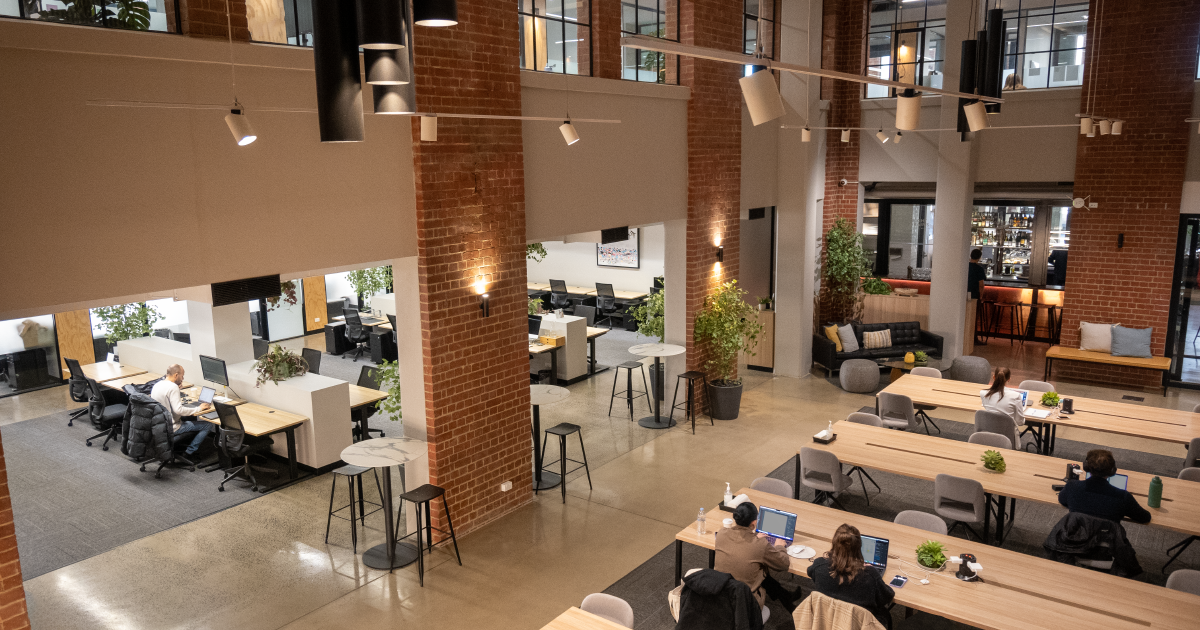
How Do Coworking Spaces Impact Employee Well-Being?
Coworking spaces have gained popularity in recent years as an alternative to traditional office environments. You may ask how do coworking spaces impact employee well-being? These shared workspaces provide an open and collaborative setting where individuals from different companies or professions work alongside each other. Coworking spaces can have a positive impact on employee well-being in several ways.
Social Interaction
Coworking spaces foster a sense of community and provide opportunities for social interaction. This can combat feelings of isolation and loneliness that remote workers or freelancers often experience. Engaging with like-minded individuals, networking, and forming professional relationships can enhance job satisfaction and overall well-being.
Increased Autonomy and Flexibility
Coworking spaces offer flexibility in terms of working hours, location, and work arrangements. Employees have the freedom to choose when and where they work, enabling a better work-life balance. This autonomy can reduce stress, improve job satisfaction, and contribute to better mental health.
Sense of Belonging
Coworking spaces provide a sense of belonging to a larger community. Members often share common goals, interests, and challenges. This shared experience can create a supportive and collaborative environment, where individuals can seek advice, share ideas, and receive feedback. Feeling connected and supported can positively impact employee well-being and productivity.
Enhanced Productivity
Coworking spaces are designed to be conducive to work, with well-equipped facilities and amenities. The absence of distractions commonly found in home or coffee shop environments can improve focus and productivity. Additionally, the presence of motivated and productive individuals in a coworking space can inspire and motivate others to perform at their best.
Learning and Skill Development
Coworking spaces often organize workshops, seminars, and networking events, providing opportunities for continuous learning and skill development. Access to a diverse range of professionals from various industries can facilitate knowledge sharing and collaboration. Acquiring new skills and knowledge can enhance job satisfaction, boost self-confidence, and contribute to personal growth.
Reduced Commute Stress
For employees who live far from their workplace, commuting can be a significant source of stress. Coworking spaces located closer to home can help reduce commuting time and associated stress. Shorter commutes can lead to improved work-life balance, increased well-being, and more time for personal activities.
Wellness Initiatives
Many coworking spaces prioritize employee well-being by offering wellness programs and initiatives. These may include yoga classes, meditation sessions, fitness facilities, or even access to outdoor spaces. Such initiatives promote physical and mental well-being, reduce stress, and foster a healthy work environment.
In short summary, it is worth noting that the impact of coworking spaces on employee well-being can vary depending on individual preferences, work styles, and the specific coworking environment. However, overall, coworking spaces provide a supportive, flexible, and engaging work setting that can positively influence employee well-being.
How Coworking spaces positively impact employee well-being
The decor of a coworking space can significantly influence employee well-being in several ways. Here are some ways in which coworking decor can impact the well-being of employees.
Aesthetics and ambiance
The overall look and feel of a coworking space can create a positive and inspiring environment for employees. Well-designed spaces with pleasing aesthetics, natural light, and comfortable furniture can contribute to a sense of well-being and motivation.
Comfort and ergonomics
Providing ergonomic furniture, such as adjustable desks and chairs, can enhance employee comfort and reduce physical strain. Comfortable seating options and designated relaxation areas can also promote relaxation and stress reduction.
Noise management
Open-plan coworking spaces can sometimes be noisy due to multiple conversations and activities taking place simultaneously. Implementing noise reduction strategies like acoustic panels, sound-absorbing materials, or designated quiet zones can help create a more peaceful and focused work environment, reducing stress levels.
Personalization and ownership
Allowing employees to personalize their workstations with personal items like photos, plants, or artwork can create a sense of ownership and belonging. This personal touch can contribute to improved job satisfaction, comfort, and overall well-being.
Biophilic design
Incorporating elements of nature, such as plants, natural materials, or views of greenery, has been shown to have a positive impact on well-being. Biophilic design can reduce stress, enhance mood, and increase productivity, creating a healthier and more enjoyable workspace.
Lighting
Adequate lighting is crucial for a comfortable and productive work environment. Natural light is preferred, as it has been linked to increased mood, energy levels, and overall well-being. Incorporating windows, skylights, or light-diffusing materials can maximize the use of natural light. Additionally, adjustable artificial lighting that mimics natural light patterns can be beneficial.
Color psychology
Colors have psychological effects, and different colors can evoke specific emotions and moods. For example, blue is often associated with calmness, while yellow can stimulate creativity. Choosing colors that align with the desired atmosphere and work activities can positively impact employee well-being and productivity.
Spaces for collaboration and socialization
Coworking spaces often emphasize collaboration and community-building. Providing comfortable and inviting areas for collaboration, such as lounge spaces, communal kitchen areas, or meeting rooms, can foster social connections and support a sense of belonging, which contributes to employee well-being.
Overall, a well-designed coworking space that takes into account the factors mentioned above can create a positive and supportive environment for employees. By prioritizing comfort, aesthetics, functionality, and the integration of nature, coworking spaces can significantly influence employee well-being, leading to increased satisfaction, productivity, and overall happiness.
Who can use a coworking space?
Coworking spaces are designed to accommodate a diverse range of professionals and individuals who need a dedicated workspace outside of a traditional office or home environment. Here are some examples of individuals who can use a coworking space:
Freelancers and independent contractors
Freelancers from various industries, such as writers, designers, developers, consultants, and artists, often utilize coworking spaces as they provide a professional setting, networking opportunities, and access to shared resources.
Startups and small businesses
Coworking spaces offer cost-effective solutions for startups and small businesses that may not have the resources to maintain a full office. These spaces provide access to essential amenities, meeting rooms, and a collaborative environment that can foster growth and networking opportunities.
Remote workers
With the rise of remote work, professionals who work remotely for companies or organizations can benefit from coworking spaces. These spaces offer a structured environment outside of their home, helping to separate work and personal life, and providing access to facilities like high-speed internet, meeting rooms, and networking events.
Digital nomads
Coworking spaces are popular among digital nomads who travel frequently while working remotely. These spaces provide a stable and productive work environment in different locations, allowing digital nomads to maintain their work routines and connect with like-minded individuals.
Corporate teams and employees
Some larger corporations and organizations opt to utilize coworking spaces for their teams or specific projects. This arrangement provides flexibility, encourages collaboration, and offers employees a change of scenery outside of the traditional office.
Entrepreneurs and innovators
Coworking spaces often foster an entrepreneurial spirit and attract individuals working on innovative projects, startups, or new ventures. These spaces offer an ecosystem of support, networking, and inspiration for entrepreneurs and innovators.
Professionals seeking networking opportunities
Coworking spaces provide opportunities for professionals to network, collaborate, and learn from others in various industries. Networking events, workshops, and communal areas encourage interaction and the exchange of ideas.
Coworking spaces are open to a wide range of individuals, each space may have its own membership requirements, pricing structure, and target audience. Some spaces may specialize in catering to specific industries or professional communities.
Why coworking spaces are the way forward for business growth in 2023
Flexibility and scalability
Coworking spaces offer flexibility in terms of lease agreements and workspace options. Businesses can easily scale up or down their space requirements based on their changing needs. This flexibility allows companies to adapt quickly to market conditions and business growth without being tied down to long-term leases or the burden of managing their own office space.
Cost-effectiveness
Coworking spaces provide cost-effective solutions for businesses, especially startups and small businesses. Renting a coworking space eliminates the need for significant upfront costs associated with setting up and maintaining a traditional office, such as furniture, utilities, and maintenance. Additionally, shared resources and amenities, such as high-speed internet, meeting rooms, and office equipment, are included in the cost, further reducing expenses.
Access to professional infrastructure
Coworking spaces offer a wide range of amenities and infrastructure that might be otherwise costly for individual businesses to acquire independently. These include state-of-the-art technology, well-designed workspaces, meeting rooms, reception services, printing facilities, and communal areas. By utilizing these resources, businesses can present a professional image, impress clients, and enhance productivity.
Collaboration and networking opportunities
Coworking spaces foster a collaborative and community-driven environment. Businesses can benefit from networking opportunities, partnerships, and knowledge sharing with other professionals and companies in the space. Collaboration can lead to new ideas, innovation, and potential business growth through referrals or partnerships.
Talent attraction and retention
Coworking spaces often attract a diverse community of professionals from various industries. This environment can help businesses attract and retain talent by providing an appealing and vibrant workplace. Employees appreciate the flexibility, networking opportunities, and work-life balance that coworking spaces can offer, enhancing their job satisfaction and productivity.
Focus on well-being and work-life balance
Coworking spaces have increasingly prioritized creating environments that promote employee well-being. They often incorporate elements such as natural lighting, comfortable workstations, relaxation areas, wellness programs, and social activities. By emphasizing work-life balance and providing a supportive work environment, coworking spaces contribute to the overall happiness and productivity of employees.
International presence and expansion opportunities
Many coworking spaces have global networks, allowing businesses to access their facilities in different locations. This feature is particularly beneficial for companies looking to expand their operations or enter new markets. Coworking spaces provide a ready-made infrastructure and a network of professionals in various cities, simplifying the process of establishing a presence in new locations.
Overall, coworking spaces offer businesses the opportunity to operate in a flexible, cost-effective, and collaborative environment. With their emphasis on community, resources, and adaptability, coworking spaces are well-positioned to support business growth and innovation in 2023 and beyond.
Coworking at United Co.
United Co takes coworking spaces to a new level by recognizing the profound impact they have on employee well-being. With a carefully curated environment, the coworking spaces prioritize the physical, mental, and social needs of professionals. The innovative design fosters a sense of belonging, with aesthetics that inspire creativity and promote a positive ambiance. By incorporating elements such as natural lighting, ergonomic furniture, and sound management solutions, United Co. ensures optimal comfort and focus. Moreover, the incorporation of biophilic design and access to communal areas and collaboration zones further nurtures employee well-being.



